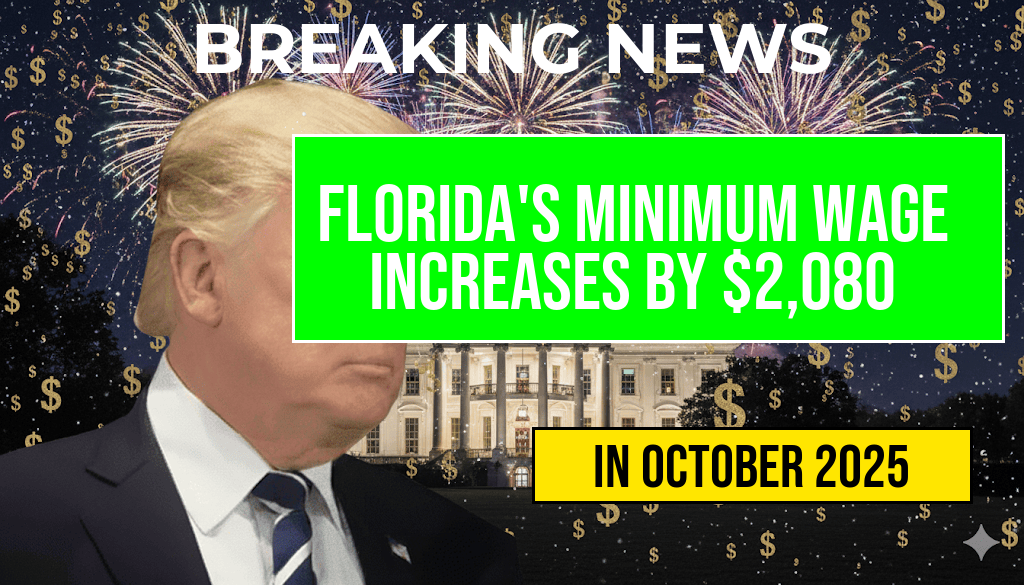Florida’s recent decision to raise the minimum wage to $14 per hour has significantly impacted the financial landscape for full-time workers across the state. This increase, which took effect on January 1, 2024, translates to an annual income boost of approximately $2,080 for employees working 40 hours a week. The amendment, part of a larger effort to gradually elevate the state’s minimum wage to $15 per hour by 2026, aims to alleviate some of the economic pressures faced by low-income households. Advocates argue that this wage increase will not only support workers but also stimulate local economies as families have more disposable income to spend. However, critics of the measure caution that such increases could lead to higher costs for businesses, potentially resulting in job losses or reduced hiring in certain sectors.
Details of the Minimum Wage Increase
The phased approach to increasing Florida’s minimum wage began in 2021, with increments each year until it reaches the $15 mark. The latest increase to $14 per hour represents a significant milestone in this initiative. Here are some key aspects of the new wage policy:
- Effective Date: January 1, 2024
- Current Rate: $14 per hour
- Projected Rate: $15 per hour by 2026
- Annual Income Increase: $2,080 for full-time workers
Economic Implications
Supporters of the wage increase argue that the additional income will have a ripple effect on the economy. According to a report from the Forbes, higher wages can lead to increased consumer spending, which in turn can stimulate local businesses. Many low-wage workers are likely to spend their additional earnings on essential goods and services, contributing to a healthier economic environment.
On the other hand, some business owners express concerns about the potential impact on their operations. Increased labor costs could force them to raise prices, reduce employee hours, or even cut jobs to maintain profitability. The Florida Restaurant and Lodging Association, for example, has stated that while they support fair wages, they are wary of how the increase might affect the hospitality sector, which is still recovering from the pandemic.
Public Response and Legislative Background
The minimum wage increase has garnered mixed reactions from the public and lawmakers. Many workers and advocacy groups view it as a much-needed adjustment to keep pace with the rising cost of living. A survey conducted by the Tampa Bay Times revealed that a majority of Floridians support the increase, believing it will help reduce poverty and improve living standards for many families.
Conversely, some legislators argue that the rapid wage hikes could lead to unintended consequences, including increased unemployment rates among vulnerable populations. They suggest that a more gradual approach would allow businesses to adapt without jeopardizing jobs.
Future Outlook
As Florida continues its path toward a $15 minimum wage, the implications of this policy will be closely monitored. Economists and policymakers will assess its effects on employment rates, business growth, and consumer spending in the coming years. The city of Miami, where the cost of living is particularly high, could serve as a case study for how increased wages affect urban economies.
| Year | Minimum Wage |
|---|---|
| 2024 | $14.00 |
| 2025 | $14.50 |
| 2026 | $15.00 |
The impact of the new minimum wage law will require ongoing analysis to ensure that it achieves its intended goals without adverse effects on the job market. As Florida navigates this economic transition, stakeholders from various sectors will play a critical role in shaping the future of employment and wage standards in the state.
Frequently Asked Questions
What is the new minimum wage in Florida?
The new minimum wage in Florida has been increased to $14 per hour.
How much will full-time workers earn annually with the new wage?
With the new minimum wage of $14 per hour, full-time workers will see an increase in their annual income by $2,080.
When did the new minimum wage take effect?
The $14 per hour minimum wage increase in Florida took effect on January 1, 2023.
How does this wage increase affect part-time workers?
While the focus is on full-time workers, part-time workers will also benefit from the $14 per hour minimum wage, though their annual income increase will depend on their hours worked.
What is the plan for future minimum wage increases in Florida?
Florida’s plan includes gradual increases, with the minimum wage set to reach $15 per hour by 2026.

Leave a Reply